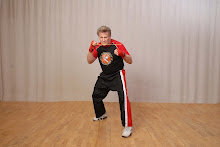Set-point Control Question
Hi Joe Lewis,
I have a problem with the set-point control tactical strategy. I work the exercise you describe in your web site video and that all works well, but when I do this in sparring I become more passive and less assertive. It appears to have kind of taken the drive out of my attacks (could just be I need more practice integrating it into my game) Many Thanks, Andrew
Answer: This is a good question. Many instructors will find students with a similar predicament, that of discovering a loss in self-assertiveness when initially learning this principle. This is all part of the integration process, which for some, may take more time to adjust.
First, you must realize that when your mind becomes more actively engaged (focusing on controlling the set-point), the body is functioning at a different frequency, and in the beginning when attempting to learn something new, the rhythm between the two is not in sync. Give your body time to catch up with the actions of the mind. Your mind is functioning on a higher level than your ability to execute appropriate physical skills.
Secondly, the instant you become aware that something is different or missing, your focus becomes split. Now you are experiencing an additional problem; you are monitoring yourself and wondering what's wrong. You cannot watch yourself and pay attention to the actions or non actions of your opponent at the same time---too much is taking place inside the conscious mind to digest all at once.
Your conscious mind is a faculty and has a limited capacity. If you fail to pay attention to only what is necessary in a given moment, then you limit the available capacity of your consciousness to be able to deal with that which is of greatest importance----the actions of your opponent.
Thirdly, you must learn how to allow thoughts to simultaneously participate in your actions (that aggressive behavior combined with profound strategic certainty). If you find yourself thinking for a split second about not letting your opponent get set-----without exercising action at the same time----then your timing is off, and you WILL perform passively.
Fourth----Any good strategy has two parts, defense and offense. When using set-point control, remember that there are only two things one can do when sparring---you can move or you can fire. With any good strategy, there has to be an appropriate balance. If you are on the battle field and currently engaged in a fire fight, and you know you only have enough ammo to last about another hour before more arrives the next morning, are you going to use it all up within the next sixty minutes in an act of desperation?
Some fighters let frustration lead to desperation----not smart. Definition of a smart fighter:
"One whose actions are in alignment with his strategic purpose"
This means BALANCE----his actions are congruent with his goals, to survive first and to win second. With set-point control, there are two factors which co-exist----not separately-----when to move and when to fire. What happens if I only move and never fire, or if I spend too much time moving and not enough time with the usage of effective firepower?
You get the picture-----without appropriate balance, anyone will fall into this trap called passiveness----too much thought and not enough action, or thought separate of action.
Cardinal Rule in Sparring:
(To avoid doubt or frustration)
"When in doubt, INSTANTLY stick and move!"
I believe, as is the case of most who spar, that the issue here is mental, not physical and that a committed work ethic will quickly put you ahead of the game. Sometimes an instructor will have a student who gets easily frustrated and finds the task or assignment given him too complex. Let me leave you with a quote from a former Commandant of the Marine Corps who I served under.
"The galleries are full of critics. They play no ball. They fight no fights. They make no mistakes, because they attempt nothing. Down in the arena are the doers. They make mistakes, because they try many things. The man who makes no mistakes lacks boldness and the spirit of adventure. He is the one who never tries anything. He is the break in the wheel of progress. And yet it cannot be truly said he makes no mistakes, because his biggest mistake is the very fact that he tries nothing, does nothing, except criticize those who do things."
--David M. Shoup (General, United States Marine Corps)

Hi Joe-Love your quote from --David M. Shoup (General, United States Marine Corps). May I repost it with credit given to you?
ReplyDeleteBest regards,
ASL
Andrew Linick/Hanshi